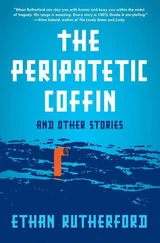He had all his possessions with him — a bundle, an umbrella, prayer-beads, and a begging bowl — and they were scattered around him where he lay propped against a latticed arch. There were also some bits of dried bun on a newspaper. He said he didn't know how long he had been lying here — sometimes it was dark and sometimes it was darker, he said. He had been thrown out of the travellers' rest-house when his two companions had moved on. He had then tried to continue his pilgrimage, but feeling very ill on the road, had dragged himself back to Satipur. He said he was still very ill. He had been lying here alone, and no one had bothered him because no one had found him except once a pariah dog had sniffed at him and gone away again.
Inder Lal, standing inside an arch at a cautious distance, warned me "Be careful. "
"It's all right," I said. "It's someone I know." I felt Chid's forehead and found it to be hot.
He groaned: "I'm thirsty… and hungry," he added, patting his stomach hard like an Indian beggar so one could hear the hollow sound.
Inder Lal had now come up cautiously and stood looking down at Chid: "Why is he dressed like that?" he asked.
"He is a sadhu," I explained. "How can he be sadhu?" "He's studied Hindu religion',"
It was horrible inside the tomb — there was an acrid smell of bat droppings and also I think Chid must have been disrespectful enough to use the place as a lavatory. I wondered what to do with him: he couldn't be left, but where should I take him?
"What has he studied?" Inder Lal asked; he was now keenly interested. "What have you studied?" he probed. "Do you know the Puranas? What about the Brahmanas?"
Chid did not hear these questions; he was looking at me with pleading, fevered eyes. "Do you live near?" he asked me. "I could walk if it's very near."
I was reluctant, but Inder Lal seemed to fancy the idea of taking Chid home with us.
10 April. Although Chid recovered from his fever after a few days, he has given no indication of leaving. I suppose it is restful for him in my room after all his travelling across India. It is not very restful for me though. I have had to lock up all my papers — Olivia's letters and this journal- not because I mind his reading them (I don't think he'd be very interested anyway) but because of the way he ruffled through them and left them scattered about with dirty finger-marks on them. These finger-marks are on everything in my room now. He makes no secret of going through my possessions and taking whatever he needs: in fact, he has explained to me that he doesn't believe in possessions and thinks it is bad for people to be attached to them. He is not very demanding, actually — he eats the food I prepare and is satisfied with everything he is given. He spends a lot of time walking around town and has become a familiar figure so that even the children have got tired of running after him. Some of the shopkeepers allow him to sit in their stalls with them and occasionally he collects quite a crowd as he sits there crosslegged and expounds his philosophy.
Everyone considers it a privilege for me to have him in my 'room. It seems I have been presented with an excellent opportunity to acquire merit by serving a holy man in charity. The question as to whether Chid is holy may remain open, but as far as the town is concerned, he has made a promising first step in shaving his head and throwing away his clothes. For this they seem ready to give him the benefit of many doubts. I've seen them do the same with Indian holy men who often pass through the town with their ochre robes and beads and begging bowls. On the whole they look a sturdy set of rascals to me — some of them heavily drugged, others randy as can be, all it seems to me with shrewd and greedy faces. But as they pass through the streets, some half naked, some fully so, rapping their pilgrim staffs and shouting out the name of God as pedlars shout their wares, people come running out of their houses to lay offerings into the ready begging bowls. Chid also has a begging bowl and often people put something in it — a banana or a guava — which he eats by himself in a corner of my room, afterwards leaving the peel on the floor. When I tell him to pick it up, he does so quite meekly.
Inder Lal is much impressed with Chid. As soon as he comes home from the office, he climbs up to my room and sits there for hours listening to Chid. Chid tells him about the centres of energy within the body and the methods to be employed in order to release them. He points now to his skull and now contorts himself so as to dig himself in the base of his spine; and then he weaves his hands; about in the air as if drawing down spiritual forces to be found there. I get very bored with all this. It seems to me that ~hid has picked up scraps of spiritual and religious lore here and there, and as he is neither an intelligent nor very educated boy, it has all sort of fermented inside him and makes him sound a bit mad at' times. Perhaps he is a bit mad.
I still don't know anything about him. Sometimes he gives me accounts of himself, but they are always different and it is impossible to reconcile one with another. Anyway, as/they deal mostly with the development of his spiritual life, they are abstract rather than personal. Inder Lal tells me this is quite all right because Chid has no personal past. When someone becomes a Hindu ascetic, all his former life indeed, his former lives — everything he has ever thought or done or been is burned up: literally burned up, for a funeral pyre is lit and the aspirant's clothes and shaved hair consumed in it in a symbolic cremation. Chid has undergone this ceremony, so that now, according to Inder Lal, h~ is nothing but the Hindu sadhu we see before us. However, he has retained his flat Midlands accent which makes everything he says even more weird.
He is always hungry, and not only for food. He also needs sex very badly and seems to take it for granted that I will give it to him the same way I give him my food. I have never had such a feeling of being used. In fact, he admits that this is what he is doing — using me to reach a higher plane of consciousness through the powers of sex that we are engendering between us. I don't really know why I let him go ahead. I'm much bigger and stronger than he is and could easily keep him off. But it seems as if there — really is something", some emanation, that does not come from him but from some powers outside himself. Because he himself is quite sexless: his cheeks are smooth except for some scattered tufts of blonde hair, and he is terribly skinny like a boy who has just got up from a sickbed. But he has constant erections and goes to a tremendous size, so that I am reminded of the Lord Shiva whose huge member is worshipped by devout Hindu women. At such times it seems to me that his sex is engendered by his spiritual practices, by all that chanting of mantras he does sitting beads in hand on the floor of my room.
15 April. Typical of the way things get mixed up in India is the story of Baba Firdaus' shrine. As the Nawab had explained to Olivia, this had originally been built by his ancestor Amanullah Khan in thanksgiving to a Muslim faqir who had given him shelter. It is now sacred to Hindu women because it is thought that offerings at this shrine will cure childlessness. But it is sacred to them for only one day a year. The reason why is open to various interpretations. Some believe that a childless woman had been driven away from her husband's home so that he could marry again. On the day of this second wedding of his she came to hide her shame and grief in Baba Firdaus' grove. Here she had a vision that within nine months of this date she would bear a child; and so it happened. The day of the festival is called Pati ki Shadi, or the Husband's Wedding Day. But there are, as I say, various other interpretations, all of them widely differing from and indeed contradicting each other.
Читать дальше












